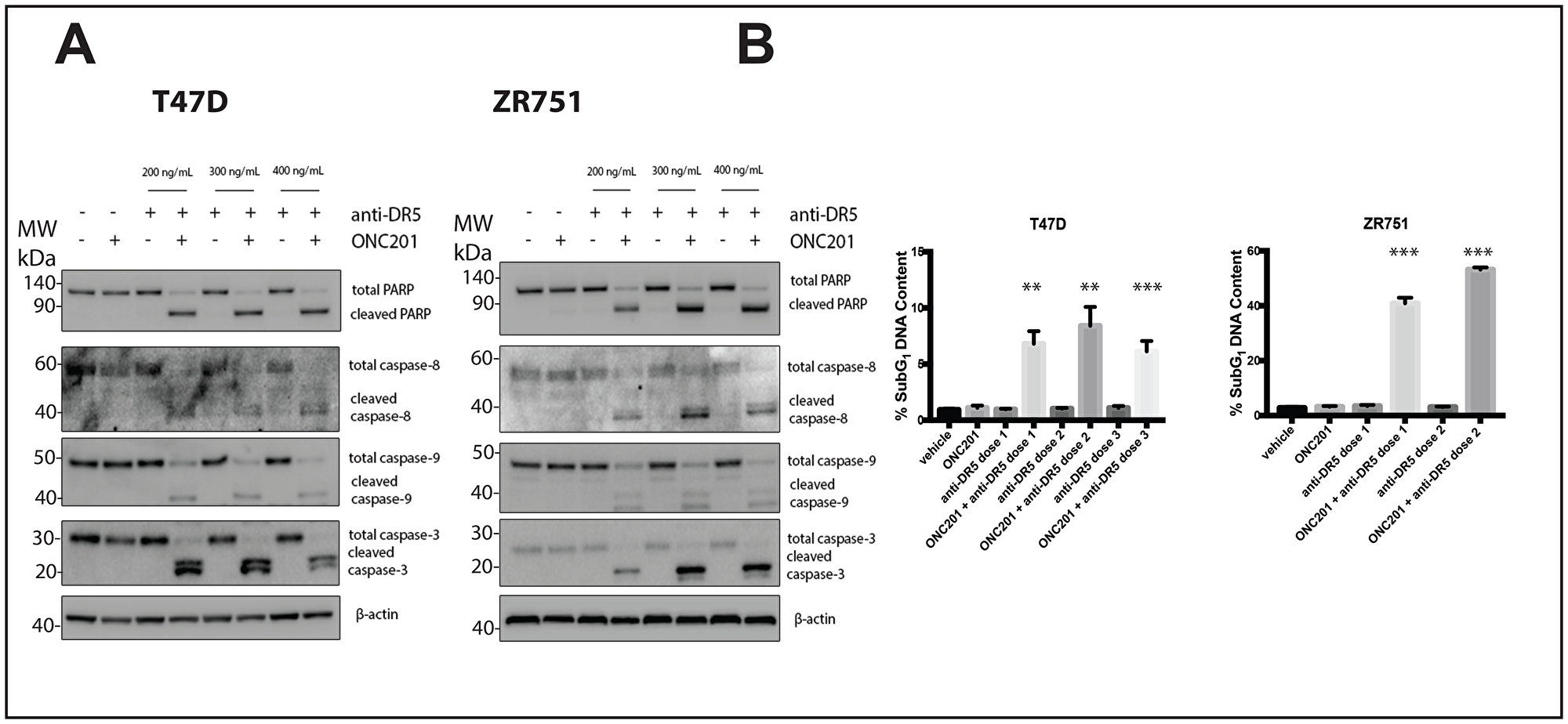Oncotarget published "TRAIL receptor agonists convert the response of breast cancer cells to ONC201 from anti-proliferative to apoptotic" which reported normal fibroblasts do not undergo apoptosis following rhTRAIL plus ONC201. In vivo, MDA-MB-361 tumor growth rate is significantly reduced following treatment with a combination of ONC201 and rhTRAIL as compared to control tumors.
Natural killer cells which use TRAIL to kill DR5-expressing cancer cells, exhibit greater cytotoxicity against ONC201-treated breast cancer cells compared to controls.
rhTRAIL also converts the response of cells from other tumor types to ONC201 from anti-proliferative to apoptotic.
A monoclonal DR5-agonistic antibody converts the response of non-TNBC cells to ONC201 from anti-proliferative to apoptotic.
These Oncotarget findings describe a novel therapeutic strategy that potently converts the response of a cancer cell to ONC201 from anti-proliferative to apoptotic.
Dr. Wafik S. El-Deiry Founding Editorial Board Member of Oncotarget said, "Breast cancer is the most commonly diagnosed cancer and is the number three cause of cancer-related death in United States women."
"Breast cancer is the most commonly diagnosed cancer and is the number three cause of cancer-related death in United States women."
The potential of TRAIL to kill cancerous cells while leaving normal cells unharmed led to the development and clinical testing of TRAIL-based therapies such as recombinant human TRAIL and death receptor agonistic antibodies.
ONC201 potently induced cell death through the extrinsic pathway in cancer cells from a variety of tumor types.
The compound is unique in that it is a dual activator of the TRAIL pathway, able not only to upregulate pro-death ligand TRAIL, but also its receptor DR5. Early studies of the mechanism of action of ONC201 showed that the compound inhibited pro-survival kinases Akt and ERK, leading to the dephosphorylation and activation of transcription factor FOXO3a.
Previous work has shown that ONC201 is a potent dual inducer of the TRAIL pathway at the level of both the ligand and the receptor, and that breast cancers show decreased sensitivity to TRAIL .
The authors hypothesized that profiling the effects of the compound on the TRAIL pathway in breast cancer and identifying blocks in signal transduction would allow us to identify therapeutic strategies with the potential to induce apoptosis and that could potentially translate to tumor regressions in patients who do not respond to treatment with ONC201 alone.

Figure 7: A DR5-agonistic antibody can also be used to convert the response of T47D and ZR751 breast cancer cells from anti-proliferative to pro-apoptotic. (A) T47D and ZR751 cells were treated with a vehicle control or ONC201 for 72 hours. Anti-DR5 antibody was added at varying concentrations for four hours and the induction of cell death was assessed using western blot. (B) T47D and ZR751 cells were treated as above and stained with propidium iodide. Specifically, ZR751 cells were treated with 200 and 300 ng/mL anti-DR5 antibody. Flow cytometric analysis of the cells was used to determine the percentage of cells with subG1 DNA content. Experiments shown in this figure were conducted in triplicate.
The El-Deiry Research Team concluded in their Oncotarget Research Output that this team's previous data showed that in breast cancer, the anti-proliferative effects of ONC201 are more common than the apoptotic effects.
While the apoptotic effects of ONC201 led to in vivo efficacy of the compound, the anti-proliferative effects did not.
In the present study, they investigated mechanisms as well as strategies to convert the response of breast cancer cells to ONC201 from anti-proliferative to pro-apoptotic.
TRAIL receptor agonists such as rhTRAIL or a DR5-agonistic antibody convert the response of these cells to ONC201 from anti-proliferative to apoptotic.
These findings may have clinical relevance as ONC201 is currently being tested in patients with breast cancer, and the authors believe that this newly identified combinatorial strategy has the potential to induce tumor regressions in patients with limited response to ONC201 monotherapy.
DOI - https://doi.org/10.18632/oncotarget.27773
Full text - https://www.oncotarget.com/article/27773/text/
Correspondence to - Wafik S. El-Deiry - [email protected]
Keywords - ONC201, TRAIL, breast cancer, death receptors, apoptosis
About Oncotarget
Oncotarget is a bi-weekly, peer-reviewed, open access biomedical journal covering research on all aspects of oncology.
To learn more about Oncotarget, please visit https://www.oncotarget.com or connect with:
SoundCloud - https://soundcloud.com/oncotarget
Facebook - https://www.facebook.com/Oncotarget/
Twitter - https://twitter.com/oncotarget
LinkedIn - https://www.linkedin.com/company/oncotarget
Pinterest - https://www.pinterest.com/oncotarget/
Reddit - https://www.reddit.com/user/Oncotarget/
Oncotarget is published by Impact Journals, LLC please visit https://www.ImpactJournals.com or connect with @ImpactJrnls
Media Contact
[email protected]
18009220957x105




